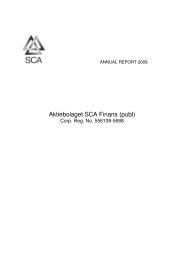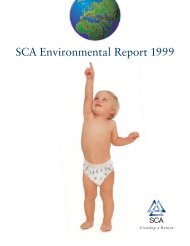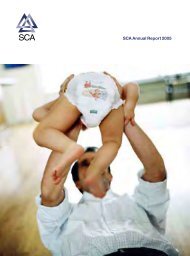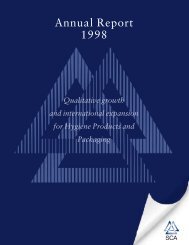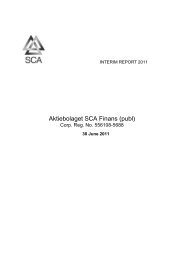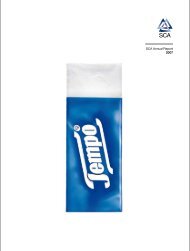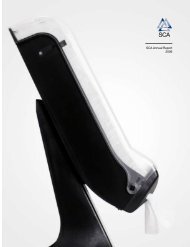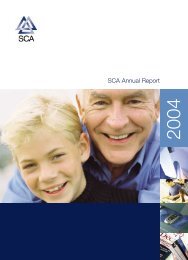Annual Report 1998
Annual Report 1998
Annual Report 1998
You also want an ePaper? Increase the reach of your titles
YUMPU automatically turns print PDFs into web optimized ePapers that Google loves.
30<br />
RAW MATERIALS AND LOGISTICS<br />
Synergistic effects of joint purchasing have reduced costs by approximately SEK 600 million.<br />
Raw Materials and Logistics is responsible for exploiting<br />
and developing synergies between the Hygiene Products, Packaging<br />
and Graphic Paper business areas.<br />
Since its inception in 1997, the goal of the Raw Materials<br />
and Logistics organization has been to reduce costs by SEK 1.2<br />
billion during a four-year period. After the first two years, cost<br />
savings total approximately SEK 600 M, of which SEK 500 M<br />
pertains to <strong>1998</strong>.<br />
Raw Materials and Logistics supervises several project<br />
groups from different business areas which cooperate via coordinated<br />
internal networks. These groups exploit synergies resulting<br />
from purchasing cooperation and reduce the costs of<br />
purchasing materials, services and equipment. Awareness of<br />
materials used by the Group increases, which helps ensure that<br />
products and services purchased are of the proper quality.<br />
A key aspect of the organization’s strategy is to develop<br />
close cooperation or partnerships with selected suppliers. By<br />
working with a limited number of suppliers, SCA will develop<br />
and improve products and services purchased by the Group.<br />
In addition to lower costs, coordinated shipments yield<br />
positive environmental effects through reducing the total number<br />
of transports.<br />
Raw materials<br />
SCA’s annual purchases of pulp, recovered paper, chemicals and<br />
other materials are valued at approximately SEK 15 billion.<br />
SCA is one of Europe’s largest consumers of recycled fiber<br />
and also uses a large proportion of fresh wood fiber in its production.<br />
It is also the largest player in the European market for<br />
recovered paper. In addition, SCA’s net purchases of pulp on<br />
the open market are in the range of 600,000 tons annually. During<br />
the year, SCA reduced the number of pulp suppliers it deals<br />
with, which lowered overall costs.<br />
SCA Recycling supplies the Group with recycled fiber via<br />
wholly owned collection operations and direct purchases. As<br />
recycled-fiber supplier to the Group’s various operations, SCA<br />
Recycling is one of the few companies that recovers a very<br />
broad range of recovered paper for production of hygiene<br />
products, packaging and printing paper.<br />
The company is represented in eight European countries. In<br />
Total wood Felling Degree of selfconsumption<br />
own forest sufficiency<br />
8.3 million m3 3.9 million m3 Of which, Sweden<br />
47%<br />
1:<br />
5.8 million m3 3.9 million m3 68%<br />
SCA’s degree of self-sufficiency<br />
Total recycled Own Degree of selffiber<br />
consumption collection sufficiency<br />
2.9 million tons2 2.3 million tons2 80% 2<br />
<strong>1998</strong>, it handled 3.1 million tons of paper for recycling, corresponding<br />
to 9% of the European recovered-paper market. As a<br />
result of its strong market position, SCA can trade within and<br />
between different markets, which is a great advantage. SCA<br />
Recycling also plays an important role in the Group’s closedloop<br />
philosophy, a cornerstone of the SCA business concept<br />
and the marketing of its products.<br />
Energy<br />
SCA is a major purchaser of energy in the European market,<br />
consuming 15 TWh annually. That amount is equivalent to the<br />
electricity produced by two nuclear reactors and the total<br />
natural-gas consumption in Sweden in one year. By means of<br />
co-generation and other techniques, SCA also produces<br />
enough energy of its own to meet 50% of its total requirement<br />
(see further under “Environment,” page 40).<br />
SCA takes advantage of the deregulation of the European<br />
electricity and natural-gas market. SCA’s agreements regarding<br />
energy delivery are being renegotiated in several European<br />
countries. Nearly all purchasing of electricity for SCA plants in<br />
Sweden has been renegotiated and the prices indexed to a<br />
Nordic electricity exchange. In 1999, SCA’s overall energy<br />
costs are expected to decrease by an additional SEK 150 M<br />
compared with <strong>1998</strong>.<br />
Transports<br />
SCA’s land and sea freight operations transport 15 million tons<br />
of products annually. SCA Transforest is mainly responsible<br />
for handling these extensive transports between Scandinavia<br />
and Europe.<br />
Coordination of transport requirements have reduced costs<br />
considerably while improving punctuality and service. Earlier<br />
agreements with suppliers have been renegotiated and better<br />
planning has reduced the number of transports with less than a<br />
full load.<br />
These measures have succeeded in reducing the environmental<br />
impact of the company’s transports. As of <strong>1998</strong>, SCA<br />
also uses oil with low sulfur content in all ships. Measurements<br />
of the environmental impact of the transports show that sulfur<br />
dioxide emissions declined by slightly less than 70%.<br />
1 Net consumption, less own sawmill chips. 2 Incl. Aylesford. 3 Excl. sales of market pulp.<br />
Integration of pulp (million tons)<br />
Total Short-fiber Long-fiber<br />
Consumption 1.4 0.6 0.8<br />
Production 0.9 0.3 0.6<br />
Net3 0.5 0.3 0.2



